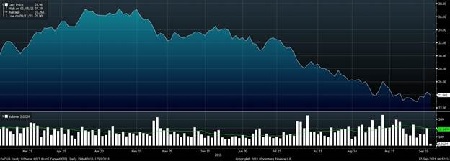The news in Brazil is particularly bad, even against a backdrop of generalized emerging-market weakness. Economic and psychological indicators are at decades-long lows. Nevertheless, with a major scandal ongoing, and the government caught between a fiscal rock and a hard place, the pain for Brazil may just keep getting worse. Investors willing to bet that a bottom is in should be ready to endure significant volatility as long as U.S. dollar strength rules the roost.
Low Tide in Brazil?
In our March 19 Market Commentary, we observed that “for the bold, there still may be an opportunity to short the Brazilian market and currency.” Since then, the iShares MSCI Brazil Capped (NYSE:EWZ), which represents the Brazilian stock market in U.S. dollar terms and thus reflects the weakness of Brazilian stocks and the Brazilian Real, has fallen more than 19 percent. In the pastfive months, Brazil has indeed gone from bad to worse.
Source: Bloomberg
In purely economic terms, the tempo of bad news has been relentless. Analysts expect the Brazilian economy to shrink 3 percent this year and 2 percent next year; this year will mark the most severe recession Brazil has experienced since the democratic overthrow of its military junta in 1985. The manufacturing PMI is at the lowest level in 4 years; industrial production contracted 1.5 percent month-over-month in July; retail sales contracted at annualized rates of 4.5 percent in May and 2.7 percent in June; consumer confidence and business confidence are both at record lows; the Brazilian real continues in free-fall, and is at a 12-year low against the U.S. dollar.
When political considerations are added in, the news gets even more dire.
The budget submitted by the government on August 31 runs a primary fiscal deficit, again for the first time since 1985. Although the government’s externally owned U.S. dollar denominated debt is relatively small, it has been rising since 2011, and Brazilian companies have significant exposure to U.S. dollar-denominated debt. The budget deficit is a defeat for the current finance minister, Joachim Levy, who was widely viewed in international markets as reliable and sober, and a force for fiscal restraint within the current Brazilian administration. He was appointed by Brazil’s current President, Dilma Rousseff, in what some viewed as a last-ditch effort to reassure the international community that she had some commitment to fiscal responsibility. But he met so much resistance from others in the Brazilian administration that his more ambitious goals were derailed, and he has now begun to express the desire to resign.
His resignation would be a further disaster for Brazil. The country’s debt was just downgraded by Standard & Poor to junk status, and other ratings agencies may follow suit. Increasingly, ratings agencies evaluating emerging-market debt are taking a broader view -- incorporating political and macroeconomic criteria into their analysis, rather than a narrow evaluation of the country’s current ability to service its debt. The effect of such downgrades will ripple through the Brazilian economy, causing rates to rise -- just at a time when the country is beginning to run a primary deficit. International holders of Brazilian debt are likely to begin (or continue) selling it off, adding more pressure.
In addition, President Rousseff remains under intense pressure as a result of the long-running bribery scandal engulfing Petrobras, the state oil giant, numerous construction firms, and dozens of government officials. The scandal keeps creeping closer and closer to the President herself, although she has not yet been directly implicated. Most recently, former President Coller, a senator and political ally of Rousseff who himself was impeached for corruption in 1992, was accused of participation in the current scandal, taking bribes that he used to buy a small stable of luxury cars. Rousseff now stands as the most unpopular president in Brazilian history, and only 32 percent of Brazilians think she’ll manage to serve out the rest of her term until 2018.
However, even if she is impeached, her likely successors are not inspiring (and her second and third in command are both under investigation themselves). In addition, they will face the same intractable situation she does: a political base dead-set against austerity, and a business community dead-set against any increases in Brazil’s already punishingly high taxes.
The diagnosis for Brazil still seems to be “more pain.” Some outside investors are coming in to bottom fish. Foreign firms with locally listed Brazilian subsidiaries are taking advantage of depressed prices to buy them out. Time will tell whether this is a genuinely buyable bottom… But for now, it looks like the pressure will still be on. Those who bet that a bottom is in or near will endure significant volatility.
Investment implications: The news in Brazil is particularly bad, even against a backdrop of generalized emerging-market weakness. Economic and psychological indicators are at decades-long lows. Smart speculators are beginning to look at Brazil and some have begun to buy.

